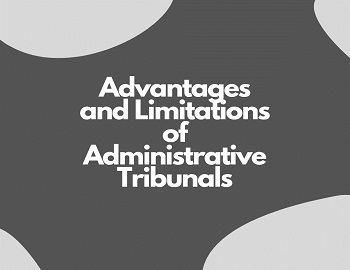Table of Contents
Advantages and Limitations of Administrative Tribunals:
Administrative Justice through the Administrative Tribunals serves more adequately the varied and complex needs of modern society. They have proved to be a very useful and effective means of providing justice. The following can be described as the major advantages of Tribunals.
(1) Means of Providing Appropriate and Effective Justice- The Administrative Tribunals are the most appropriate and effective means of providing justice to individuals. The tribunals dispense justice and benefits to the employees who rightfully belong to them.
(2) Flexibility- There is a considerable amount of flexibility and adaptability in the functioning of these tribunals. They are not bound by rigid rules of procedure. The rules of natural justice are adaptable to the situation. Moreover, these tribunals are free from the complex technicalities of law.
(3) Less Expensive- Justice by Administrative Tribunals is less expensive in terms of the costs involved. In ordinary courts, huge costs are incurred in engaging lawyers, paying court fees and meeting other expenses. On the contrary, tribunals provide easy accessibility to government employees.
(4) Relief to Courts- There is a great rush of cases in ordinary courts. These tribunals provide relief to the judicial courts which are preoccupied and over-burdened with many cases.
Administrative Tribunals Procedure of Work:
So far as the procedure of work of the tribunals is concerned, normally, each tribunal has its own procedure. Yet one finds that there are certain common rules of procedure usually followed by all the administrative tribunals. Some tribunals sit in public, others, however, sit in private. A person aggrieved by any order pertaining to any matter within the jurisdiction of a tribunal can make an application to it for the redress of his grievances. Such applications have to be in the prescribed form and have to be accompanied by relevant documents and evidence and fee as prescribed by the Act. With regard to legal representation, tribunals vary in their practice. There are some tribunals that may ban legal representation except through lawyers, while others may not do so. As to evidence, tribunals also vary in their practices. While some follow the legal rules of evidence, some others prefer to disregard them. Every application is decided by the tribunal on the examination of documents and written representation. The applicant may either appear in person or through a legal representative who will present the case before the tribunal. The orders of the tribunals are binding on both parties. The parties can approach the Supreme Court against the orders of the tribunals.
Limitations on the Functioning of Administrative Tribunals:
(1) The Administrative Tribunals do not rely on uniform precedents and this can lead to arbitrary and inconsistent decisions.
(2) The absence of an appellate forum within the tribunal system can cause considerable inconvenience.
(3) The tribunals may consist of administrative members and technical heads who may not possess a background in judicial work.
Despite these limitations, Administrative Tribunals have been doing useful and productive work in all the countries in which they are at work. These have done a good service to the judicial system by reducing the burden of law courts. Their advantages have made them popular instruments of administrative adjudication. Consequently, the number of Administrative Tribunals has been constantly on the increase. The system has proved useful and effective. It not only provides relief to the ordinary courts but also ensures speedy and inexpensive justice to the employees. However, efforts are needed to get eliminated the defects that happen to characterize their working.




![President of India [Article 52-62]- GK 5 President of India](https://gkscientist.com/wp-content/uploads/2021/05/President-of-India-Article-52-62.jpg)




Comments (No)